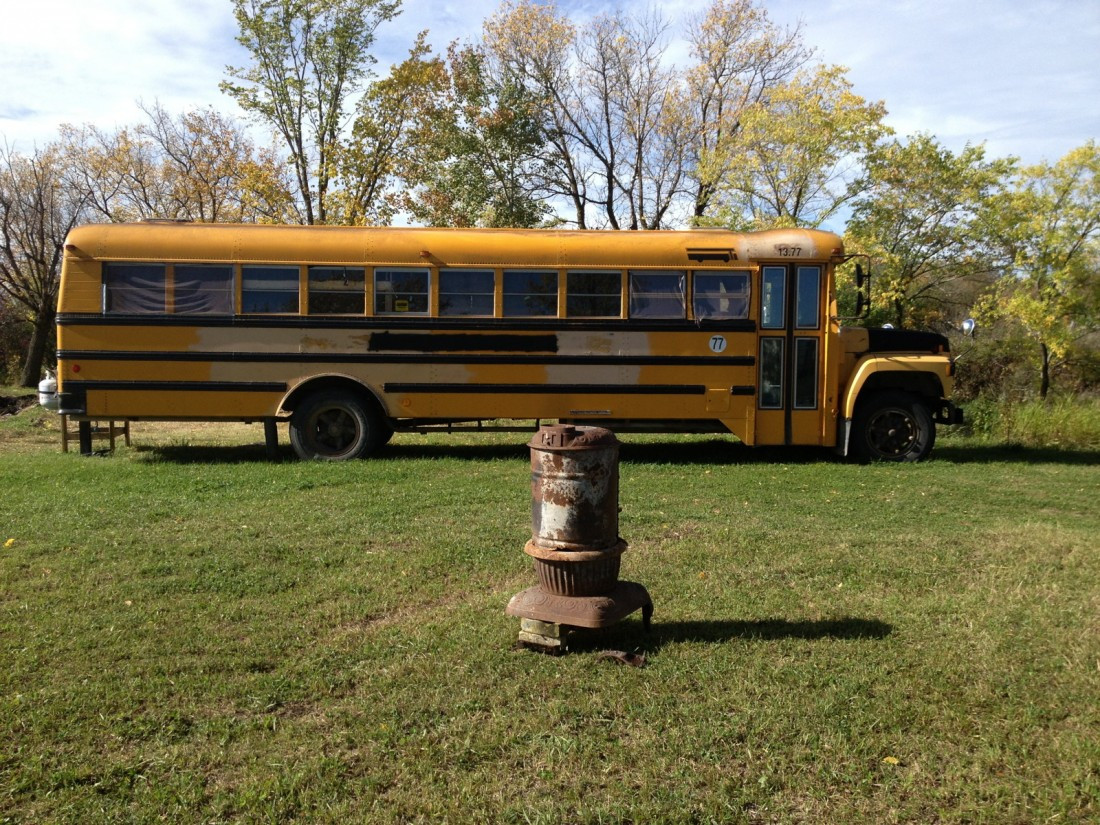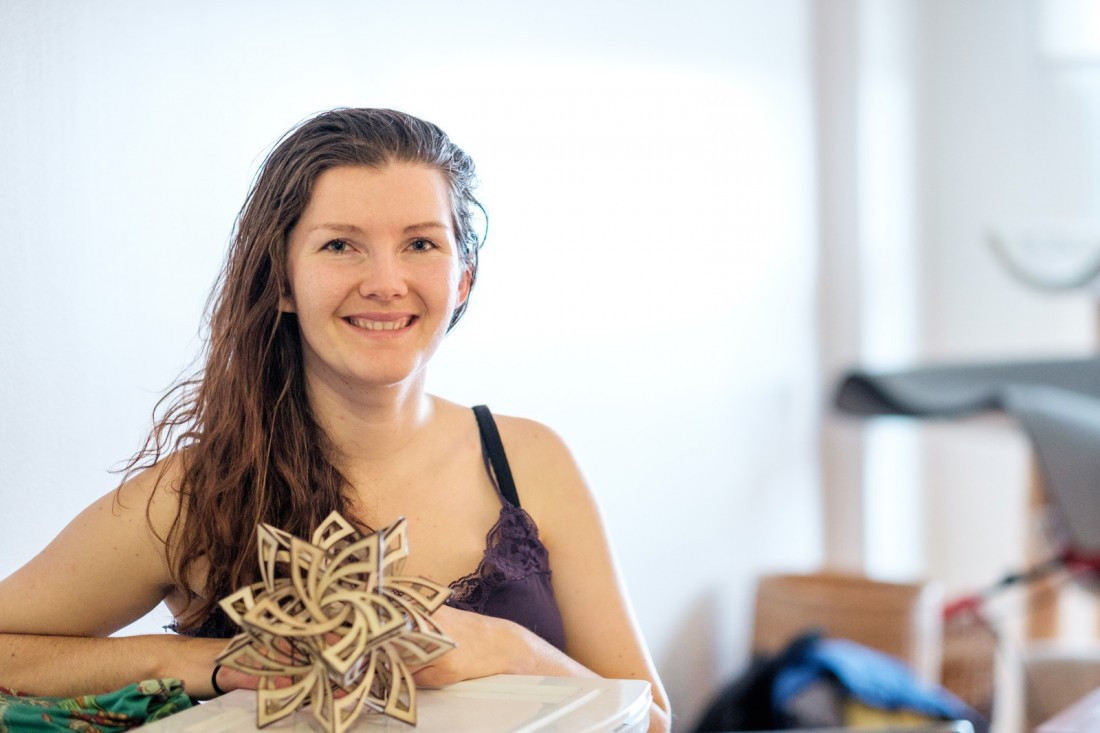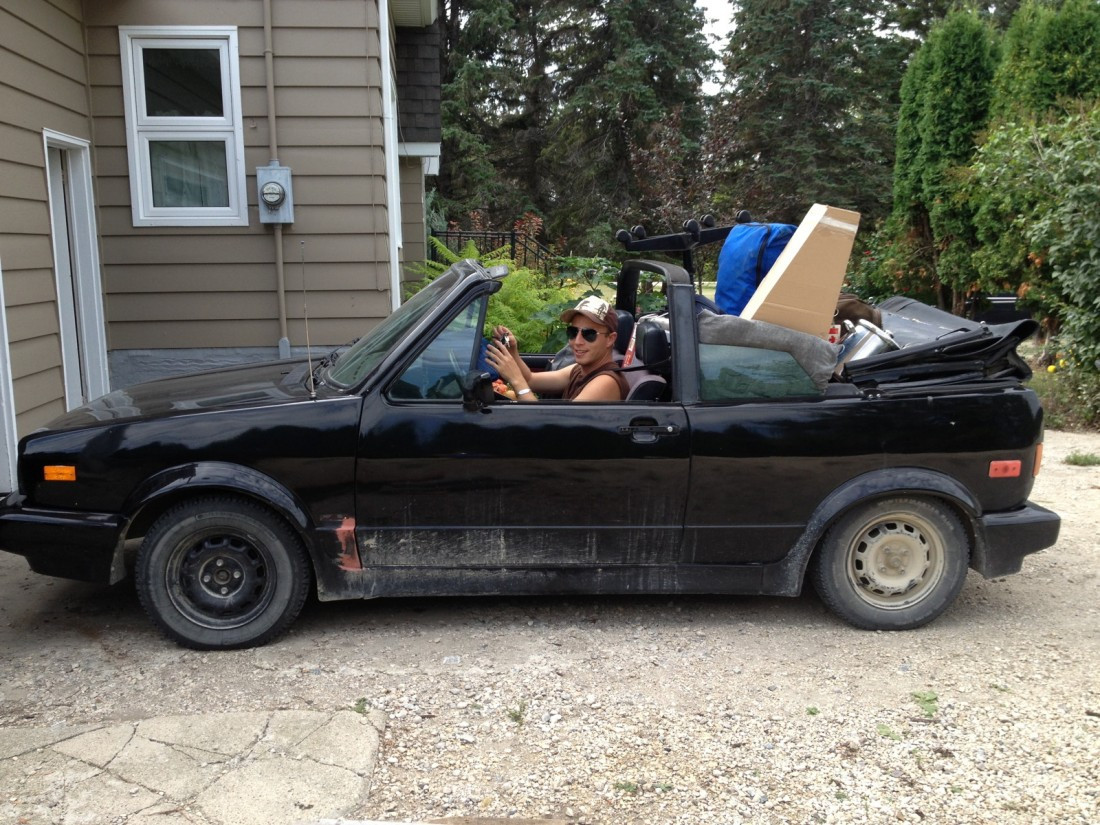Weird living
Manitobans get creative to get by
The cost of rent is on the rise in Winnipeg. According to the Canada Mortgage and Housing Corporation, rent in 2014 was up to an average of $1,016 from $969 in 2013.
For some people, this means they need to work more. For others, it means they need to budget less money for going out or for groceries. But some people are finding ways to safely house themselves without making those sacrifices.
Instead of accepting high rent as a fact of their lives, these three Manitobans have found alternatives that fit their lifestyles.
The bus
This pooch is enjoying some alternative housing thanks to Mike Chopek's ingenuity. Photo by Mike Chopek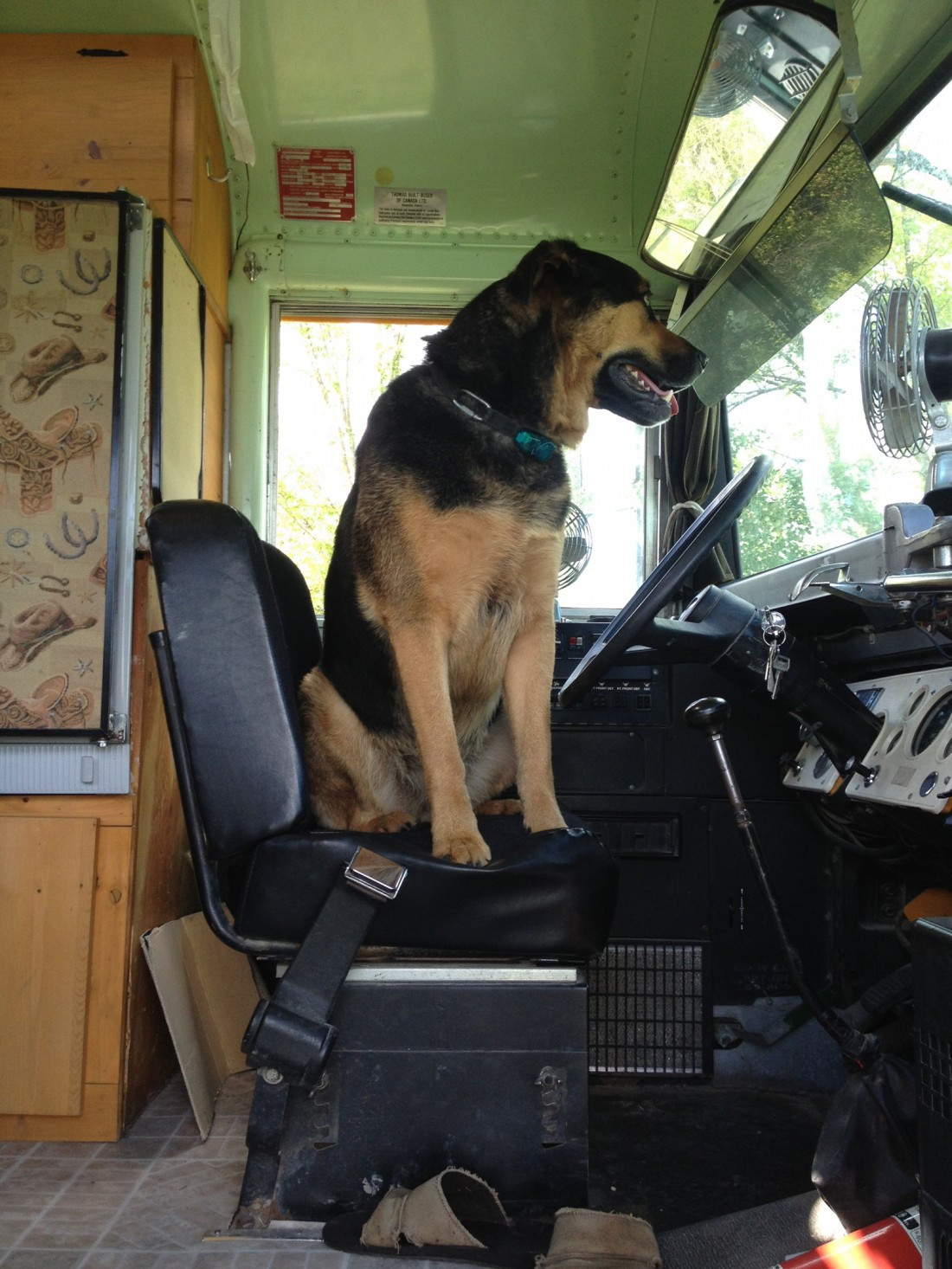
During the school year, he lives in northern Manitoba. In the summer, he lives on a plot of land one hour east of Winnipeg.
Three years ago, Chopeck decided he wanted to spend his summers growing a garden. In part, he did this because he wanted to bring his Grade 2 and 3 students to southern Manitoba where they could learn about agriculture.
Chopeck bought a piece of land, but didn’t have the time or money to build a permanent structure. Part of it was getting building permits.
He didn’t want to deal with the bureaucracy, but still needed a structure on the property to live in. The bus solved his problem.
“It’s a little better than staying in a tent,” Chopeck says.
The interior of Mike Chopek’s converted bus. Photo by Mike Chopek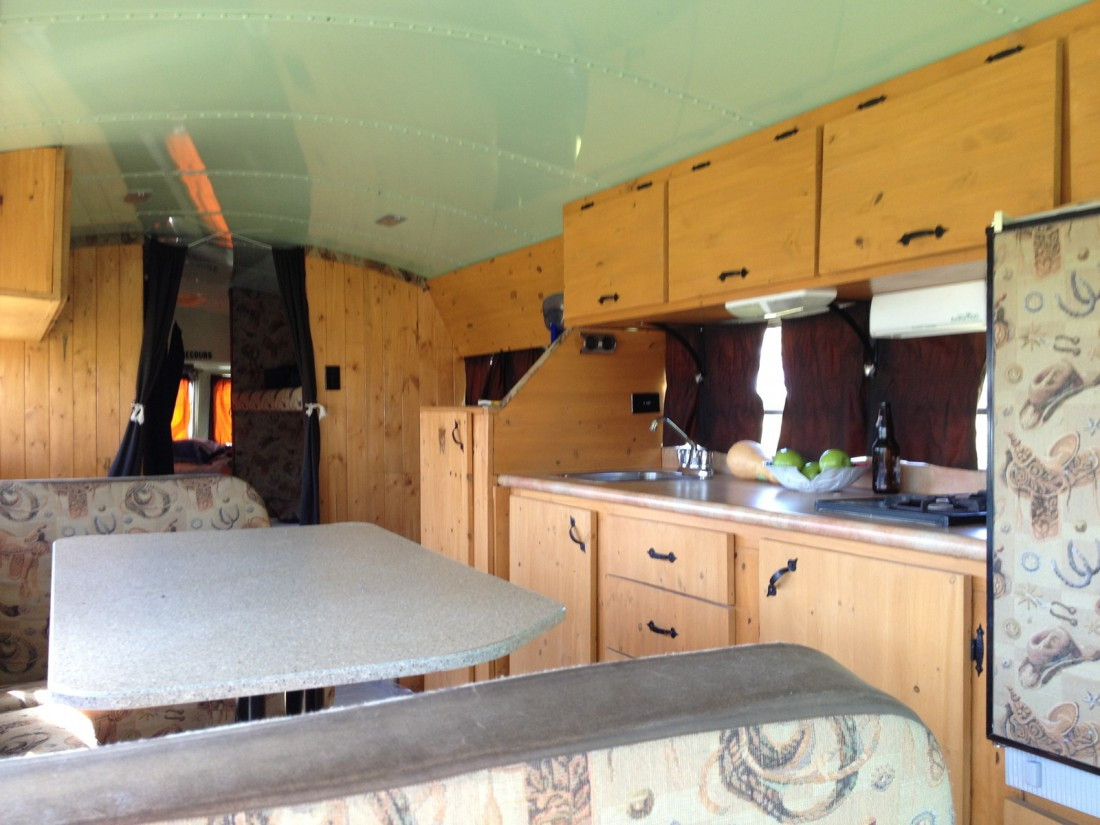
For one, there is no running water, but he plans to run water to the bus from a nearby stream. Right now, he thanks that stream for keeping him clean and he hauls in drinking water.
Chopeck says he will get around to building a shack for himself one day, but the bus will stay on the property as a guest house.
Group housing
Musician Jessie Zifarelli felt he had to make a choice between having a traditional living situation and following his passion. He chose the latter and took up residence at Pan Am Boxing’s Transitional Youth Housing and Recreational Facility Project.
“It’s a building for guys only and it’s for people who are in a tough situation. They’re coming out of jail. They’re coming out of a bad living situation with their parents or they were into drugs. It’s for guys who want to get their life on the right track,” Zifarelli says.
Zifarelli says having a safe home gives the men time to do what they want to get ahead in life, whether that’s finding employment, going to school or, in his case, working on a music career.
He was previously living in Frame Arts Warehouse, which was shut down in August. He only had two days to find an affordable place to move.
“There were no rooms that anybody had available for rent, unless they were in really, really bad neighbourhoods and I didn’t want to go there,” Zifarelli says.
Zifarelli was living at Frame because he preferred to be surrounded by artists, which made working toward his goal easier.
“Instead of my neighbour being an accountant, my neighbour was a painter. And my other neighbour was a pianist. And the other was a guitar player,” Zifarelli says.
He said it allowed them all to thrive as artists.
“I like being around other people who are likeminded and working towards a common goal,” Zifarelli says. At Pan Am, the other men are not working towards artistic goals, but all are trying to better themselves and Zifarelli says that helps him stay motivated.
He has lived in apartments with roommates and said he likes the freedom, but right now it’s not a financially viable option.
He says as a young person, it’s hard to get the requirements to have an apartment. He’s never been approved for an apartment because he doesn’t make enough money to meet most rental agencies’ standards.
“I’m a young guy. I don’t have college or anything like that,” Zifarelli says. “There’s no entry-level jobs that pay that much.”
He says it’s unfair, but he is happy working as a musician and isn’t willing to change career paths for more money.
“It wasn’t worth it to sacrifice my soul and my identity,” Zifarelli says.
Housesitting
Anneliese Schoppe, a full time housesitter, stands with most of her belongings. Photo by Daniel Crump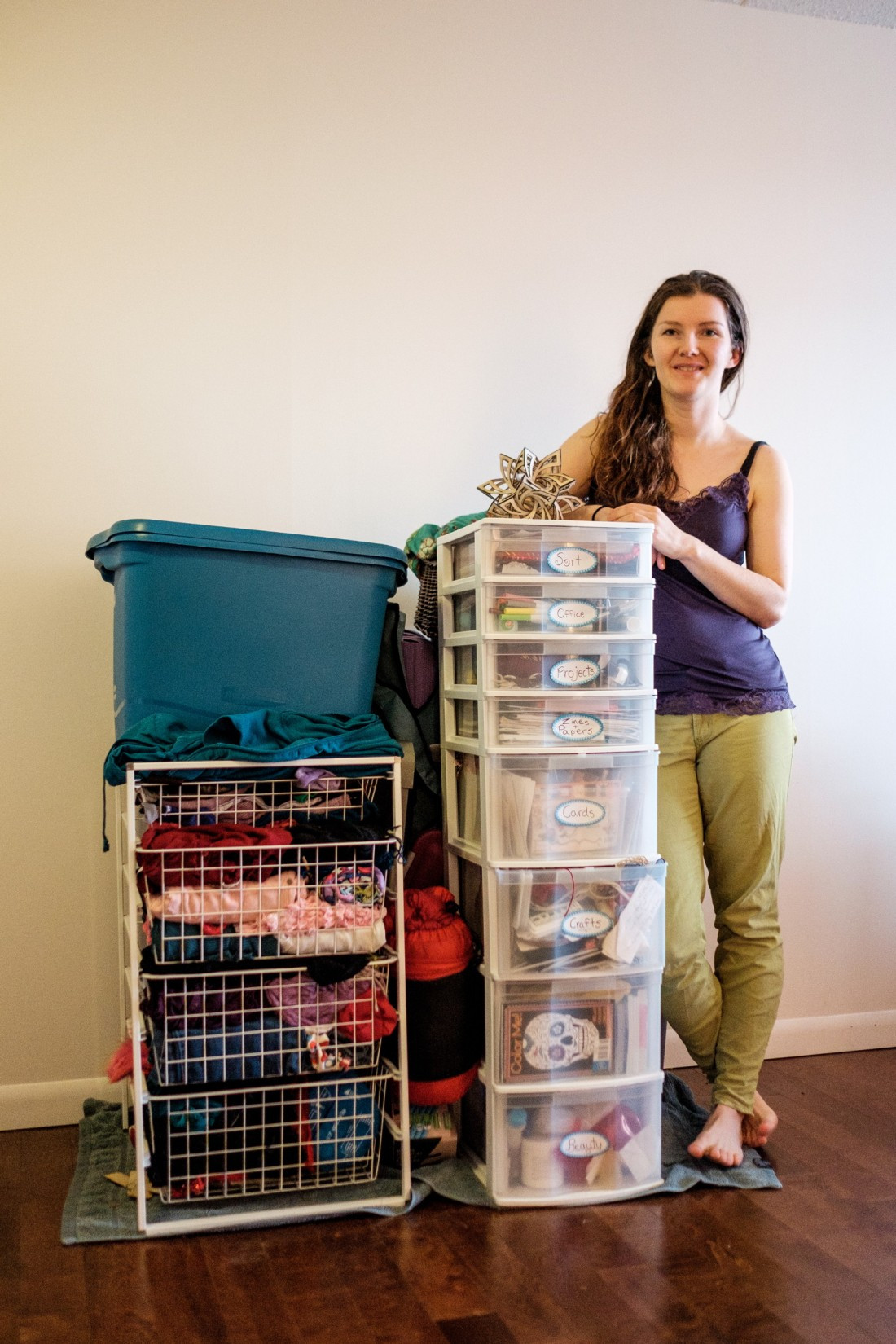
She has been housesitting for more than a year, moving from home to home. She started by working for friends, but word of mouth has gotten her gigs for strangers all over the city.
“Occasionally I will rent a friend’s room for a couple weeks if there’s a gap,” Schoppe says.
She says it forced her to get a rid of a lot of her belongings. She can move everything she owns, which includes a mattress, in one truck load.
“I love Rubbermaid tubs,” Schoppe says. Because they are easy to move, waterproof and mouse proof, she says they’re ideal for moving and for storing.
“It is kind of a little tricky at times to stock a fridge or pantry,” Schoppe says.
Some of the homes she stays in have pristine sets of cutlery, dishes and towels that she’s not comfortable using, so she brings along her own.
“There’s a feeling that you don’t necessarily want to unpack too much or make it homey,” Schoppe says.
But she does get to be a temporary pet mom without having any long-term commitment.
One of her favourite animals to care for was Rotund, an 18 year old cat who needed a lot of special care, including medication and to be kept on a strict meal plan.
“He’d spit and get old cat food on your face,” Schoppe says. “Even though he was so gross, he was so cute.”
She initially got into house sitting because of the huge financial savings.
“It was always the biggest chunk of my budget,” Schoppe says, referring to rent.
Unlike other parts of a budget, like groceries, the amount paid for rent cannot be changed month-to-month, depending on a person’s situation, Schoppe says. Rent is a constant amount and she didn’t want to have to deal with that anymore.
“For the most part, I was always able to pay it. I was just resentful of how high it felt,” Schoppe says.
Schoppe also looks at it as a good way to share resources.
“One thing I like about housesitting is it’s kind of like a car co-op in a sense that you want to make something used as much as it possibly can be,” Schoppe says.
When someone is overseas, it just makes sense for another person to live in their home, both to use the space and to keep it safe.
...
Buses, community housing and house sitting are just three alternatives to paying high rent.
Some people choose to move out of the city to build sustainable houses, such as Earth ships, or purchase tiny homes.
Others choose to couch surf, get involved with farm stays or find other inexpensive ways of keeping themselves housed inexpensively to save cash or allow themselves the freedom to pursue their passions.
Rents may be on the rise, but paying more to live isn’t necessarily the only option.
Published in Volume 70, Number 14 of The Uniter (January 7, 2016)


